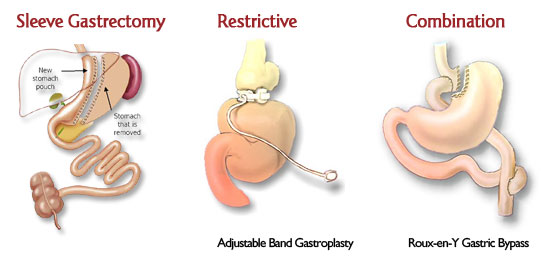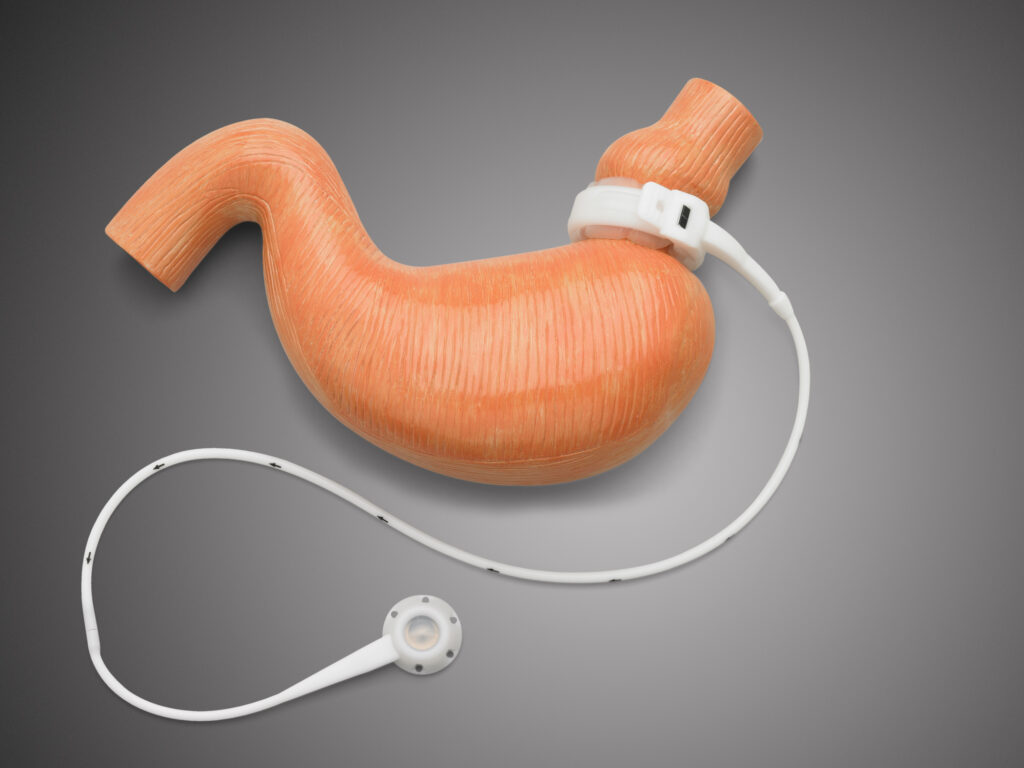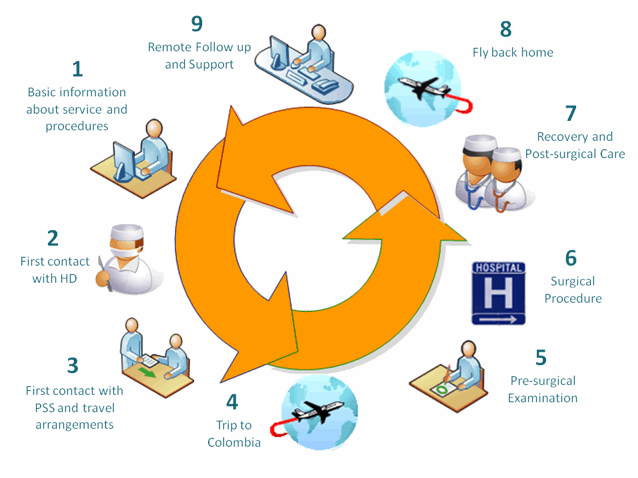There are several different types of bariatric surgery, or surgery done on the stomach and/or intestines to alter the normal digestive process, which in turn helps people lose weight. Each of the various types of bariatric surgery has its own advantages and disadvantages. The two most frequently done types of bariatric surgery are the Gastric Bypass and the Lap-Band surgery.
Bariatric Surgery: Articles on Bariatric Surgery
Articles and News on Weight Loss and Bariatric Surgery
Is Weight Loss Surgery Right for You?
For those people who are clinically obese, dropping some extra pounds just isn’t that easy. Obesity isn’t simple to conquer, and can be a long-term problem for many people. For those who haven’t had success with traditional diet and exercise plans, weight loss surgery may be the ideal answer.
Bariatric Surgery: Extreme Measures for Extreme Results
In the past, bariatric surgery was extremely rare and done only in the most life-threatening cases for patients who were morbidly obese. But with time, practice, and the emergence of positive statistics about the success rate of the procedure, more and more chronically obese people are choosing to have this type of procedure. At present, bariatric surgery is done more frequently than any other type of non-cosmetic elective surgery.
Choosing the Right Doctor for Bariatric Surgery
There are numerous bariatric surgeons throughout the country, and choosing the one who is best-suited to you and your needs can be difficult. Here are some suggestions for how to select the best doctor for your weight loss surgery.
Weight loss surgery is often the final option for people who are severely overweight and have tried unsuccessfully to lose excess pounds with traditional diet and exercise plans. There’s no question that weight loss surgery can help obese individuals lose those unwanted pounds, but deciding to have the surgery isn’t always that easy.
Considering Weight Loss Surgery
Here are some essential questions you should ask yourself before you decide on weight loss surgery.
What are the Different Types of Weight Loss Surgery
Listed are some of the most common types of bariatric surgery that are used today; however, there are numerous variations of the procedures, which are selected based on the individual’s needs.
Options for Weight Loss Surgery
Weight loss surgery can be grouped into three categories, all of which are designed to reduce the stomach capacity by creating a new, smaller stomach pouch, or by shortening the digestive tract by joining the stomach and the large intestines. The small intestines are bypassed in these procedures.
Should you Consider Weight Loss Surgery?
Weight loss surgery can involve either of two approaches, according to The American Society for Bariatric Surgery. One type includes restrictive procedures, which help to limit the patient’s need for food intake to one meal a day, but don’t affect the digestion of food. The other type includes malabsorptive procedures, which alter the process of digestion and thus help the patient to reduce their absorption of calories.
Bariatric Surgery- The Latest Weight Loss Trend for Teens
In addition, obese teens suffer from various types of social alienation, particularly in a culture that puts so much emphasis on physical appearance.
While overweight young people are proving successful at losing up to 22 pounds – some with the help of diet drugs – this amount of weight loss is considered just minimal, as many teenagers need to lose much more than that.
The Realize Band works in the same way that other gastric banding products do: It is inserted around the upper portion of the stomach using laparoscopic techniques, which are minimally invasive and can lead to a much shorter recovery period
Seven Myths You Need to Know About Lap Band
Many people who have been overweight for their entire life regard Lap Band surgery as an easy fix. But in fact, this procedure should be seen as the opportunity to make significant and long-lasting lifestyle changes.
When people refer to Lap Band slippage, they are most often talking about the weight loss procedure known as the Lap Band system, which uses gastric banding to bind off a portion of the stomach, leaving just a small pouch of stomach to receive food.
Is Lap Band Surgery Appropriate for Obese Teenagers?
With the obesity rate among teenage Americans now standing at epidemic proportions, bariatric surgery has become a viable option for overweight youths. And though the procedures done on young people are fewer than those done on adults, the fact remains that teens are seeking surgical solutions to their weight problems.
This short guide will give you the fundamental information on this type of procedure, which is one of the many surgeries that use Laparoscopic Adjustable Gastric Banding – or the “Lap Band.”
Bariatric Surgery: The Way To A Smaller Stomach
In recent years, many celebrities have emerged to praise the benefits of bariatric surgery. Among them are American Idol’s Randy Jackson, weatherman Al Roker, and Roseanne Barr. All of these high-profile celebs reported drastic weight loss, saying they dropped several clothing sizes, their self-esteem got a tremendous boost, and they simply felt healthier.
People who have tried unsuccessfully to lose weight through traditional diet and exercise plans may consider the gastric bypass procedure, a type of bariatric, or weight loss surgery which is done to reduce the patient’s food intake.
What Happens in Gastric Bypass Surgery
There are two goals for gastric bypass surgery: first, a small pouch is made in the stomach that will restrict the amount of food intake, food intake; and then bypasses are formed to cause malabsorption of calories and other food nutrients in the duodenum and other segments of the small intestine.
The Advantages of Gastric Bypass
One of the leading health problems in the U.S. is obesity, despite a wide range of nationwide diet and fitness programs formulated by expert nutritionists and dietitians, not to mention the ongoing shower of media attention that the topic has merited.
Bariatric Surgery: The Step-by-Step Process
Anyone considering weight loss surgery to treat morbid obesity should be aware of everything that is involved in this journey. The following 10 steps outline the process
Medicaid Guidelines for Coverage of Bariatric Surgery
Bariatric surgery is considered medically necessary when it is used as a treatment for medical conditions that were caused by or worsened by the patient’s obesity. These conditions must be so severe that the benefits of eventual weight loss clearly outweigh the risks associated with bariatric surgery.
Bariatric Surgery Trends in California Hospitals
The increasing popularity of weight loss surgery prompted the State of California to examine hospitalization data for bariatric procedures, focusing on patient characteristics, cost, outcomes, and the hospitals where the surgeries were performed
Revisional Bariatric Surgery: Weight the Benefits and Complications
While revisional bariatric surgery may benefit the majority of patients who request it, the procedure doesn’t come without certain risks, according to a recent study done to determine if the surgery is truly safe and effective.
According to a study on the two, the Roux-en-Y gastric bypass has been linked to better weight loss and improvement in comorbidities than the gastric banding. The study also suggests that gastric banding has long-term complications and high reoperation rates than the other. However, the gastric bypass has a high rate of quick complications































